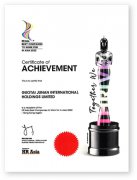In 2022, the illicit market in the European Union continued its growing trend, rising by an estimated 0.7%, mainly driven by increases in countries like France and Belgium.
France remains the largest illicit market in the EU and now accounts for 47% of total illicit cigarette consumption in the region. An estimated 8 billion illicit cigarettes consumed in France were counterfeited products.
LAUSANNE, Switzerland -- (BUSINESS WIRE) --
Philip Morris International Inc. (PMI) (NYSE: PM) today warns about increasing rates of illicit cigarette consumption in the European Union (EU), which are depriving governments of billions in tax revenues and eroding tobacco control policies. PMI calls for a reassessment of policy choices that may be contributing to the year-over-year growth of the illicit market in the region and for innovative approaches that can help drive millions away from continued smoking to be considered.
The 2022 KPMG annual study on illicit cigarette consumption in the EU, U.K., Norway, Switzerland, Moldova and Ukraine, commissioned by Philip Morris Products SA, reveals that 35.8 billion illicit cigarettes were consumed across the EU alone, causing governments the loss of an estimated €11.3 billion in tax revenue—8.5% more than in 2021. The growth of the illicit market in the EU was partly driven by the continued rise of counterfeit consumption, which reached its highest level ever recorded. Notably, the vast majority of counterfeits (61.5%) were consumed in France.
“Some countries unwilling to embrace innovation and make better alternatives to cigarettes available to adult smokers who would otherwise continue smoking continue to rely on policies that have contributed to the current state of illicit trade. The cost of ignoring the negative impact of illicit cigarettes on adult smokers, and on public health, is too high to turn a blind eye to,” stated Gregoire Verdeaux, senior vice president of External Affairs, PMI. “It has truly become a ‘made in the EU’ problem, as fake cigarettes are being manufactured, distributed, sold, and consumed in countries within the EU, undermining efforts to reduce and eliminate cigarette smoking—and public health goals altogether.”
According to interviews with law enforcement agencies included in the KPMG report, the production and distribution of counterfeit cigarettes within EU borders is increasing, with criminal organizations centering their activities toward higher-taxed and higher-priced EU member states and gaining larger profits. Countries such as Belgium, Denmark, France, and Germany are witnessing a growth in cigarette seizures and raids on clandestine manufacturing operations.
“The KPMG report clearly shows how the growth of the illicit cigarette market poses an existential threat to the industry’s sustainability and transformation in Europe. We can observe how the illicit cigarette problem in the EU has become highly concentrated in a handful of countries, where governments have not embraced innovative approaches to effectively deter millions from continued smoking,” added Verdeaux. “Traditional tobacco control policies are simply not enough. Aggressive fiscal policies, prohibitionist approaches, and lack of deterrence in countries like France and Belgium are only benefitting criminals and pushing adult smokers toward the black market.”
Despite the overall illicit consumption increase, the KPMG study notes that the majority of EU members— 21 out of 27 countries—experienced a stable or declining share of illicit cigarette consumption in 2022. Excluding France, overall illicit consumption in the remaining markets in the study declined by 7.5%, largely due to decreases in Greece, the Netherlands, Portugal, and Romania. Particularly, in countries like Poland and Romania, illicit consumption reached the lowest-ever incidence since KPMG began publishing its annual studies.
“Effective policymaking, fiscal calendars, deterrent penalties, and impactful enforcement are enabling several EU member states to experience a decline in the consumption of illicit cigarettes,” said Massimo Andolina, president Europe region at PMI. “In other countries, it is unfortunate to witness the legal market shifting toward one that is run by criminal networks, which attest to the failure of disproportionate tax increases, and regulatory frameworks that do not contemplate the principle of risk differentiation. The KPMG report should serve as a wake-up call for regulators and policymakers in the EU to consider that millions of consumers are relying on the black market to continue smoking.”
Moldova and Ukraine were included in the KPMG report for the first time. The 2022 findings placed Ukraine as the second-largest market in Europe for illicit cigarette consumption, with 7.4 billion cigarettes, behind France’s 16.9 billion. The share of illicit cigarettes in Ukraine has followed an increasing trend since 2018—in 2022, one out of five cigarettes consumed stemmed from the illicit market. The third-largest illicit market in Europe is the U.K., with 5.9 billion illicit cigarettes, on the rise since 2020.
“In these times of economic hardship, with inflation putting extra pressure on consumer purchasing power, we need robust law enforcement, comprehensive regulatory approaches and forward-thinking policies that can help improve the lives of millions of adults who continue to smoke,” noted Verdeaux. “This includes the adoption of differentiated policies on alternatives to cigarettes, including access to information about better alternatives, and smoke-free products that are available and affordable for all. No one should be left behind.”
A detailed overview of the results and methodology of the KPMG report is available here.
For more information about PMI’s illicit trade prevention efforts, visit PMI.com.
Note to editors
For PMI, eliminating the illicit tobacco trade has been a long-standing priority. We rely on the latest technology to secure our supply chain and protect our products, while implementing preventive and protective measures to fight illicit trade and working with public and private sectors to advance efforts against this global issue. PMI continues to support relevant regulations like the FCTC Protocol to Eliminate Illicit Trade in Tobacco Products and the EU Tobacco Products Directives’ tracking-and-tracing provisions.
The KPMG report estimates the size and scale of illicit cigarette consumption, known as counterfeit & contraband (C&C), which includes illicit whites. The annual study defines these in its glossary as follows:
- Contraband: “Genuine products that have been either bought in a lower-tax country and exceed legal border limits or acquired without taxes for export purposes to be illegally re-sold (for financial profit) in a higher priced market.”
- Counterfeit: “Cigarettes that are illegally manufactured and sold by a party other than the original trademark owner.”
- Illicit whites: “Cigarettes that are usually manufactured legally in one country/market, but that evidence suggests have been smuggled across borders during their transit to the destination market under review where they have limited or no legal distribution and are sold without payment of tax.”
More information about the share incidence of each illicit category is available on page 12 of the KPMG report.
Forward-Looking & Cautionary Statements
This press release contains forward-looking statements, including statements regarding regulatory, market, and industry expectations as well as business goals and strategies. Achievement of future results is subject to risks, uncertainties and inaccurate assumptions. In the event that risks or uncertainties materialize, or underlying assumptions prove inaccurate, actual results could vary materially from those contained in such forward-looking statements. Pursuant to the “safe harbor” provisions of the Private Securities Litigation Reform Act of 1995, PMI is identifying important factors that, individually or in the aggregate, could cause actual results and outcomes to differ materially from those contained in any forward-looking statements made by PMI.
PMI's business risks include: excise tax increases and discriminatory tax structures; increasing marketing and regulatory restrictions that could reduce our competitiveness, eliminate our ability to communicate with adult consumers, or ban certain of our products in certain markets or countries; health concerns relating to the use of tobacco and other nicotine-containing products and exposure to environmental tobacco smoke; litigation related to tobacco use and intellectual property; intense competition; the effects of global and individual country economic, regulatory and political developments, natural disasters and conflicts; the impact and consequences of Russia's invasion of Ukraine; changes in adult smoker behavior; the impact of COVID-19 on PMI's business; lost revenues as a result of counterfeiting, contraband and cross-border purchases; governmental investigations; unfavorable currency exchange rates and currency devaluations, and limitations on the ability to repatriate funds; adverse changes in applicable corporate tax laws; adverse changes in the cost, availability, and quality of tobacco and other agricultural products and raw materials, as well as components and materials for our electronic devices; and the integrity of its information systems and effectiveness of its data privacy policies. PMI's future profitability may also be adversely affected should it be unsuccessful in its attempts to produce and commercialize reduced-risk products or if regulation or taxation do not differentiate between such products and cigarettes; if it is unable to successfully introduce new products, promote brand equity, enter new markets or improve its margins through increased prices and productivity gains; if it is unable to expand its brand portfolio internally or through acquisitions and the development of strategic business relationships; if it is unable to attract and retain the best global talent, including women or diverse candidates; or if it is unable to successfully integrate and realize the expected benefits from recent transactions and acquisitions. Future results are also subject to the lower predictability of our reduced-risk product category's performance.
PMI is further subject to other risks detailed from time to time in its publicly filed documents, including PMI's Annual Report on Form 10-K for the year ended December 31, 2022, and the Form 10-Q for the first quarter ended March 31, 2023. PMI cautions that the foregoing list of important factors is not a complete discussion of all potential risks and uncertainties. PMI does not undertake to update any forward-looking statement that it may make from time to time, except in the normal course of its public disclosure obligations.
Philip Morris International: Delivering a Smoke-Free Future
Philip Morris International (PMI) is a leading international tobacco company working to deliver a smoke-free future and evolving its portfolio for the long term to include products outside of the tobacco and nicotine sector. The company’s current product portfolio primarily consists of cigarettes and smoke-free products. Since 2008, PMI has invested more than USD 10.5 billion to develop, scientifically substantiate and commercialize innovative smoke-free products for adults who would otherwise continue to smoke, with the goal of completely ending the sale of cigarettes. This includes the building of world-class scientific assessment capabilities, notably in the areas of pre-clinical systems toxicology, clinical and behavioral research, as well as post-market studies. In November 2022, PMI acquired Swedish Match - a leader in oral nicotine delivery - creating a global smoke-free champion led by the companies’ IQOS and ZYN brands. The U.S. Food and Drug Administration (FDA) has authorized versions of PMI’s IQOS Platform 1 devices and consumables and Swedish Match’s General snus as Modified Risk Tobacco Products (MRTPs). As of March 31, 2023, PMI’s smoke-free products were available for sale in 78 markets, and PMI estimates that approximately 18.5 million adults around the world had already switched to IQOS and stopped smoking. Smoke-free products accounted for approximately 35% of PMI’s total 2023 first-quarter net revenues. With a strong foundation and significant expertise in life sciences, PMI announced in February 2021 its ambition to expand into wellness and healthcare areas and, through its Vectura Fertin Pharma business, aims to enhance life through the delivery of seamless health experiences. For more information, please visit www.pmi.com and www.pmiscience.com.
View source version on businesswire.com: https://www.businesswire.com/news/home/20230627118809/en/
CONTACT:
Philip Morris International
David Fraser
T. +41 (0)58 242 4500
E. david.fraser@pmi.com







